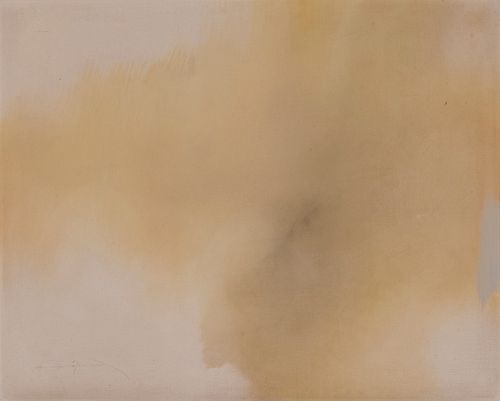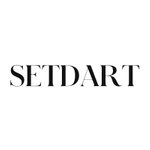FERNANDO ZÓBEL (Manila, Philippines, 1924 - Rome, Italy, 1984). "Sunset with poplars", 1978. Oil on canvas. It has a Theo gallery label (Madrid), on t
Lot 85
About Seller
Setdart Auction House
Carrer Aragó 346
Barcelona
Spain
Setdart Subastas was born in 2004 and is currently the first online art auction in Spain with solidity, prestige and reliability guaranteed by our more than 60,000 users. Setdart has a young, dynamic and enterprising team ready to successfully manage the purchase and sale of art works through custom...Read more
Estimate:
$120,000 - $130,000
Absentee vs Live bid
Two ways to bid:
- Leave a max absentee bid and the platform will bid on your behalf up to your maximum bid during the live auction.
- Bid live during the auction and your bids will be submitted real-time to the auctioneer.
Bid Increments
| Price | Bid Increment |
|---|---|
| $0 | $10 |
| $200 | $25 |
| $500 | $50 |
| $1,000 | $100 |
| $3,000 | $200 |
| $5,000 | $500 |
| $10,000 | $1,000 |
| $20,000 | $2,000 |
| $50,000 | $5,000 |
About Auction
By Setdart Auction House
Jun 17, 2021
Set Reminder
2021-06-17 06:15:00
2021-06-17 06:15:00
America/New_York
Bidsquare
Bidsquare : 19th & 20th Century Contemporary Art - Select Lots
https://www.bidsquare.com/auctions/setdart-auction-house/19th-20th-century-contemporary-art---select-lots-7081
Setdart Auction House sofia@setdart.com
Setdart Auction House sofia@setdart.com
- Lot Description
FERNANDO ZÓBEL (Manila, Philippines, 1924 - Rome, Italy, 1984). "Sunset with poplars", 1978. Oil on canvas. It has a Theo gallery label (Madrid), on the back. Titled and dated on the back. Measures: 80 x 100 cm; 82 x 102 cm (frame). A soft and vaporous brushstroke defines this conceptual landscape, in which Zóbel retains a certain vibration in the stroke, denoting the transmutation of a changing reality, immersed in a completely personal atmosphere, which stands out for its lyricism and poetic aesthetics as artistic synesthesia. This work made in 1978, has a great similarity with the piece that belongs to the collection of the Juan March Foundation, "The view XXVI", both reflect the artist's interest in the landscape, and that balanced tension, which generates a view where the elements of nature are adapted to a contained abstraction. However, it should be noted that this work is also close to the series he made during the 80's, in which he introduced a change in the way of applying color, providing greater chromatic activity and playing with the gradations of tones, creating more dynamic and daring compositions. Historian, patron of the arts, university professor and collector are some of the adjectives corresponding to the figure of Fernando Zóbel, one of the most outstanding painters of the 20th century in Spain. The formation and cultivation of his personality, never ceases to develop, highlighting his love for books. He studied Medicine in the Philippines and graduated in Philosophy and Arts at Harvard University in the United States, being at this time when he became interested and involved with the pictorial world influenced by the Boston School, whose palette showed almost pure colors framed by a very marked drawing. Thus, in 1951 he took up the chair of Fine Arts at the Ateneo de Manila. Zóbel's evolution and need to develop a personal artistic language led him to explore the world of abstraction influenced by Rothko, or the expressionism of Pollock or de Kooning, working on very valid non-figurative proposals. To this, it is necessary to add the great influence and interest he felt towards oriental cultures, increasing this eagerness with his participation in a Chinese archaeological excavation discovered in the Philippine peninsula of Calatagan. As it was said, Zóbel's work drinks from the East, so much so that oriental calligraphy is the one that favors the presence of sinuous lines of great elegance, which can be appreciated in the work that concerns us, in which the meticulous and thoughtful previous work can be appreciated. And there is nothing left to chance in his apparently spontaneous painting, all of them contain a period of reflection and previous execution, because, as he said: "my process is the process of sketch, drawing, sketch and painting", a planning that gives rise to perfect scenographies formed by movement, lines, speed, space and light. His work is represented in important museums such as the Museo de Arte Contemporáneo Español in Valladolid, the Museum of Fine Arts in Boston, the Museo Nacional Centro de Arte Reina Sofía, the Museo de Bellas Artes in Bilbao, the Brooklyn Museum of Art in New York, the Joslyn Art Museum in Omaha (Nebraska), the Hispanic Society of America, as well as in collections such as Chase Manhattan Bank, the AENA Art Collection of Contemporary Art in Madrid, as well as the Banco Urquijo in Barcelona.
- Shipping Info
-
In-house shipping available. Please inquire at admin@setdart.com.
-
- Buyer's Premium



 EUR
EUR CAD
CAD AUD
AUD GBP
GBP MXN
MXN HKD
HKD CNY
CNY MYR
MYR SEK
SEK SGD
SGD CHF
CHF THB
THB
















